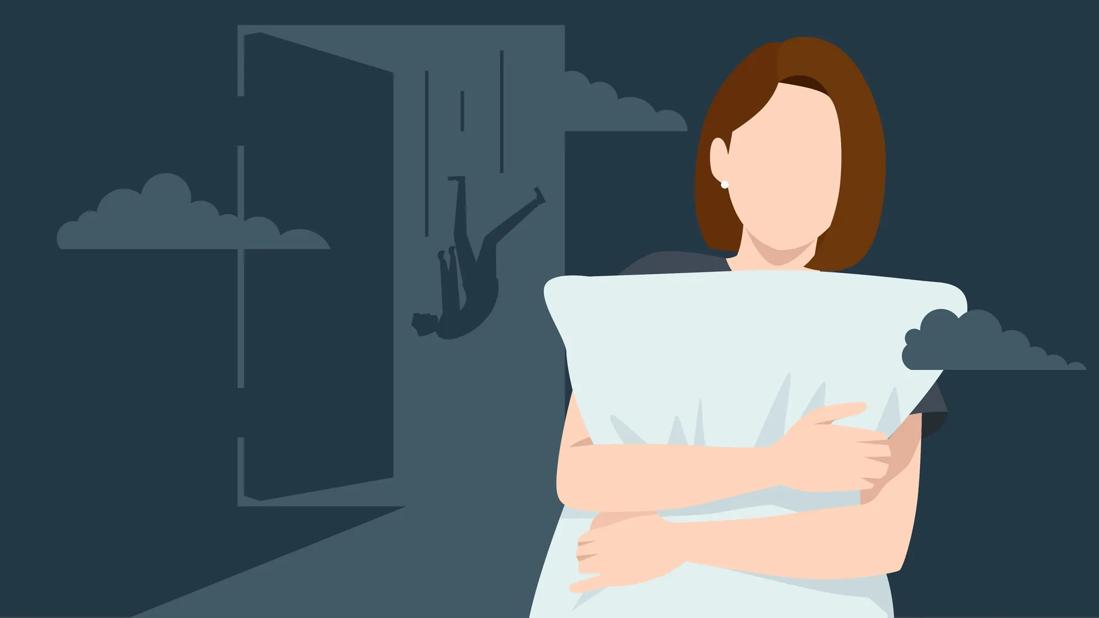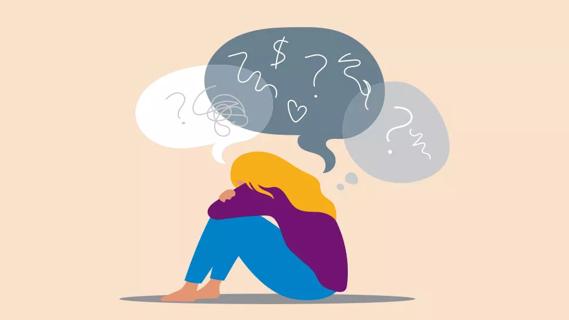Managing stress can help you sleep more soundly

We’ve all been there — you wake up from a dream feeling like you spent the night in crisis. Your heart is pounding. You’re covered in sweat. The details may be fuzzy, but that on-edge feeling remains.
Advertisement
Cleveland Clinic is a non-profit academic medical center. Advertising on our site helps support our mission. We do not endorse non-Cleveland Clinic products or services. Policy
Sounds like an anxiety dream. And you’re far from alone in having them.
We talked with behavioral sleep medicine psychologist Michelle Drerup, PsyD, DBSM, about how to keep anxiety and stress from haunting you in your dreams.
Anxiety dreams, also called stress dreams, are vivid, emotionally intense dreams that center on high-stress situations — like showing up to take a test that you never studied for or rushing to catch a flight only to realize you’re in your PJs. They can leave you feeling uneasy, worried or panicked when you wake up. You may not remember exactly what happened in your sleep, but the emotional toll lingers.
While anxiety dreams can be distressing, they’re not necessarily the same as nightmares.
“Nightmares are usually more intense, with strong feelings of fear, terror or helplessness that often wake you up,” Dr. Drerup clarifies. “Anxiety dreams, on the other hand, tend to focus more on stress or worry — like being unprepared or overwhelmed. They may not feel as frightening, but they still leave you unsettled.”
Stress during your day is the most likely trigger for anxiety dreams at night.
Scientists still don’t fully understand why we dream, but one theory is that dreaming helps our brains process emotions, store memories and solve problems.
Advertisement
“Dreams are like a mental sorting system,” Dr. Drerup explains. “They help us work through what we’ve experienced during the day, especially anything emotionally charged. Anxiety dreams are usually a reflection of stress and emotional overload. They’re your brain’s way of processing worries and unresolved tension while you sleep.”
Being stressed is associated with poor sleep, and it can trigger more frequent anxiety-ridden dreams. So, it’s not uncommon to have trouble sleeping or have distressing dreams during stressful times in your life, like if you’re grieving a loss, moving, getting a new job or preparing for a big exam.
Stress dreams may also happen more if you’re living with depression, substance use disorder or an anxiety disorder, like PTSD or panic disorder.
Though the meaning of dreams isn’t always clear-cut, stress dreams can be a sign of unresolved stress and anxiety in your life. They often reflect real-life stressors — especially ones you haven’t fully dealt with during the day.
“Your brain continues to process thoughts and emotions while you sleep,” Dr. Drerup further explains. “Anxiety dreams can be a signal that something’s bothering you and needs your attention.”
If you’re constantly waking up panicking in a cold sweat over your dreams, take it as a sign that it’s time to address the stress and lessen the tension in your life.
Anxiety dreams tend to follow certain themes, including the ever-popular “naked at school” dreams. Other examples include things like:
Advertisement
You can’t always control your dreams, but you can influence how anxiety affects your sleep.
“If you can better manage stress in your day, you’ll likely decrease anxiety dreams and improve your sleep,” Dr. Drerup advises.
Try these strategies:
Advertisement
“Improving your stress management during the day can have a big impact on your sleep at night,” says Dr. Drerup. “The fewer stressors your brain has to process, the less likely it is to work overtime while you’re trying to rest.”
If stress and anxiety are affecting your life or sleep, a therapist can make a big difference. You deserve better days and more restful nights.
Advertisement
Learn more about our editorial process.
Advertisement

Going home isn’t always easy, but there are ways to ease any stress you might feel

This fast-acting anxiety medication should never be taken with alcohol, despite what you may see on The White Lotus

Deep breathing, positive mantras and tackling negative thoughts can help get you out of your head and cool down your anxiety

Focusing on what you can see, feel, touch and hear can help you feel more present in the moment

Performance anxiety and stage fright are outsized stress responses that can creep up when you’re put on the spot

A healthy amount of anxiety can keep you safe from harm and motivate you to take action

Although different conditions, they can occur together or cause one another

Breathwork, sleep meditation and avoiding screens can help fight back morning anxiety

Wearing a scarf, adjusting your outdoor activities and following your asthma treatment plan can help limit breathing problems

Your diet in the weeks, days and hours ahead of your race can power you to the finish line

When someone guilt trips you, they’re using emotionally manipulative behavior to try to get you to act a certain way